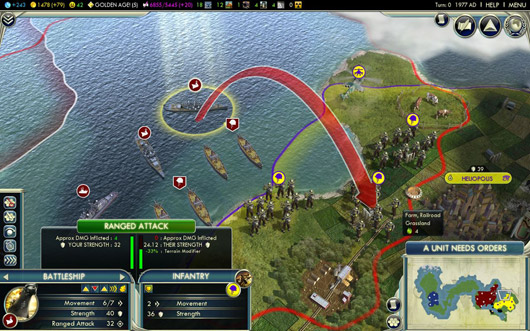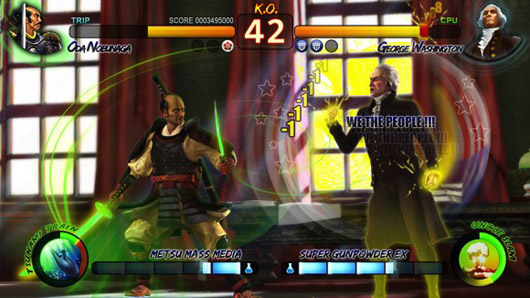Civilization has been a mainstay of the turn-based strategy genre on Windows PCs since 1991 with Sid Meier’s Civilization. This latest entry offers some incredible features for armchair Caesars, pharaohs, presidents – whatever you call yourself these days! For the uninitiated, Civilization has always been about turn-based, strategic development of a virtual empire from the stone age to the future colonization of Alpha Centauri. There are multiple ways of doing this, from cultural victories in which other nations of the world simply cannot resist turning to your way of life (with their cities declaring allegiance to your own), to the more standard domination victory which is where a nation simply conquers the rest in play.

Visually Civilization V takes advantage of the full-array of the latest PC technologies – including DirectX 11 effects. Thankfully, for those of you without those high-end GPUs, the game still fully-supports and takes advantage of DirectX 9 and DirectX 10 extensions.
In-game audio is adequate, although it is a tall order to recreate the sounds of an entire world. Instead, the developers focus on just playing sounds that are key to the actions taking place. When a unit moves, you hear marching – when it builds something, you hear the noise of construction. The game’s musical score is very clever – reflecting whichever nation/empire you choose to helm throughout the ages. Play as the American empire and you will hear Revolutionary War-style flutes early on, and more contemporary music later in the game.
The game’s diplomacy system has been enhanced quite a bit over its predecessors. Instead of being treated to a small window with the foreign leader’s face inside, you now get a full-screen window featuring the leader standing, waiting your audience. Some leaders, such as Montezuma, hover over elaborate set pieces. The new interface is not the only upgrade to the diplomacy system – now you have many more diplomatic options to pursue with foreign leaders. Options such as declaring secret pacts of cooperation against a particular enemy civilization. This is a pledge that both sides will do whatever is necessary to de-stabilize the target’s government without going as far as declaring war against them. Foreign leaders also now more realistically-react to your proposals.
Combat has also been tweaked for the better. Instead of being able to stack as many military units on top of one hex, now you can only support one per hex. While the military units in Civilization IV were visually denoted by about three of the particular unit standing next to each other in one hex (like three swordsmen or three warriors) – the military units now feature many more soldiers representing the unit. Coupled with only being able to place one military unit per square and it makes your armies look REALLY big at times, with them sprawled out over the territory.

Siege weapons, like catapults and ship-boar cannons, now feature a ‘ranged combat’ feature which allows them to engage enemy units from, well, range. Civilization V’s combat actually reminds me a lot of Panzer General, which is a plus as that game was incredibly fun. Also now taken more into account are unit experience and bonuses along with terrain modifiers – all making for a much more tactical game of combat.
By far, however, one of the most interesting new features of Civilization V is the nation-state. Nation-states are simply small, one-city empires that, while not able to do everything larger empires can, are instrumental in your course of world domination. Nation-states in Civ V act a whole lot like the ‘Minor Races’ did in Microprose’s 4X Star Trek title, Birth of the Federation. They can ally themselves with standard empires, fight in wars, and build units. For instance, in one long play-through of the game, I was acting as the Greek Empire and I had conquered one nation-state, thinking this was a good way of annexing a new city into the fold. I then proceeded to do this to two more nation-states… Apparently, they all shop at the same store or something as, in the next turn, all the remaining nation-states declared war on me at once. This unexpected turn of events made for a precariously-interesting situation as then all of the larger empires allied with them also declared war on me. Basically, in the course of two turns I had the entire world against me. Nation-states also have a very needy attitude, often-times announcing to the world something that they desire. If you satisfy the desire, which can be anything from obtaining a resource to the destruction of a rival nation-state, you gain faction with them.
The game also supports multiplayer gameplay, with players able to control their own empires – each vying for control on an AI-laden world. In fact, the only game mode that I would have liked to have seen in the game would be the April Fool’s Day ‘Extreme Diplomacy’ mode.
Overall, Civilization V is an incredible turn-based strategy title which perfectly blends the constructive, diplomatic, and combative elements from previous Civ titles, and amps them up to the Nth-degree. You owe it to yourself to try this game out as soon as possible.

(Extreme Diplomacy Mode in Would-be Action)




